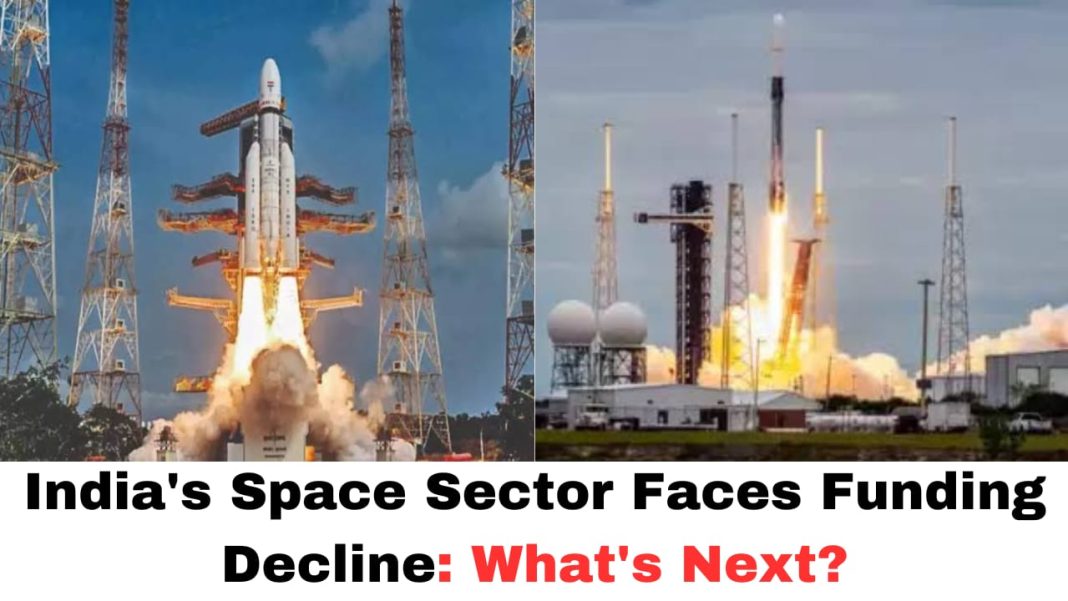Digital News Guru Current Affairs Desk:
The global space industry, often viewed as a frontier of innovation and progress, faced significant funding challenges in 2024. In India, the space sector saw a notable decline in investment, with funding dropping by 55% to $59.1 million from $130.2 million in 2023, as reported by market intelligence platform Tracxn. This trend reflects a global slowdown, with space sector investments worldwide decreasing by 20% during the same period. Despite this setback, there remains optimism about the future of space exploration and technology, driven by government initiatives and innovative startups.
India’s Space Funding Decline
India’s space industry funding decline has raised concerns among stakeholders, particularly given the country’s ambitious goals in space exploration. Over the past five years, Indian space startups have raised $353.5 million across 72 funding rounds. However, the sharp drop in 2024 highlights vulnerabilities in the funding ecosystem, exacerbated by global economic uncertainties and shifting investment priorities.

Interestingly, the decline comes despite India achieving several milestones in space exploration. In 2024, ISRO successfully landed the Chandrayaan-3 spacecraft on the Moon, becoming the first country to reach the lunar south pole. Additionally, the launch of the Aditya-L1 solar probe showcased India’s growing capabilities in advanced space missions. These achievements underscore the paradox of declining financial backing amid technological progress.
Global Trends in Space Sector Investments
India’s funding challenges are part of a broader global trend. The worldwide space economy grew to an estimated €121 billion in 2024, reflecting a 7% increase in institutional space budgets compared to 2023. Despite this growth, private investments in space technology declined, signaling caution among investors. Factors such as inflation, geopolitical tensions, and market volatility have contributed to this hesitancy.
Defense expenditures in space have surged globally, accounting for 53% of public space investments in 2024. In contrast, commercial space initiatives, such as satellite servicing and private space exploration, have experienced slower growth. This shift underscores a growing focus on national security and strategic dominance in space rather than purely commercial ventures.
Government Support and Policy Interventions
In response to the funding shortfall, the Indian government has introduced several measures to support the space sector. A $119 million fund has been approved to boost space startups, with a target of increasing India’s share in the global commercial space market from the current 2% to 10% by 2033. This initiative is expected to stimulate innovation and attract private investments.

ISRO has also projected an increase in its budget to support upcoming missions and research. The organization’s emphasis on collaboration with startups and private firms aligns with its strategy to enhance India’s competitiveness in the global space race. By fostering a robust ecosystem for space technology, the government aims to mitigate the effects of declining venture capital inflows.
Opportunities Amid Challenges
Despite the funding decline, the Indian space sector remains poised for growth. Several factors contribute to this optimism:
- Rising Global Space Economy: The global space sector is projected to grow to $1.1 trillion by 2030, offering opportunities for Indian companies to capture a larger market share.
- Technological Advancements: With missions like Chandrayaan-3 and Aditya-L1, India has demonstrated its ability to execute complex space projects cost-effectively. These achievements enhance India’s credibility as a space technology leader.
- Startup Ecosystem: Indian space startups, such as Skyroot Aerospace and Agnikul Cosmos, are at the forefront of innovation, focusing on small satellite launches and reusable rocket technology. These companies are well-positioned to attract foreign investments and partnerships.
- Global Collaborations: India’s growing partnerships with countries like the United States, the European Union, and Japan offer opportunities for joint missions and technology sharing, further bolstering the sector’s growth prospects.
The Path Forward
To address the challenges posed by declining investments, a multi-pronged strategy is required. Key actions include:
- Encouraging Private Participation: Expanding public-private partnerships can bridge the funding gap and drive innovation in space technology.
- Policy Reforms: Simplifying regulatory processes and offering tax incentives for space tech investments can attract more investors.
- Focus on Sustainability: Developing technologies for satellite servicing and debris management can position India as a leader in sustainable space operations.
Conclusion
The decline in space industry funding in India and globally reflects the challenges of navigating a complex and dynamic economic landscape.

However, India’s commitment to advancing its space program, supported by government initiatives and entrepreneurial spirit, presents a promising path forward. By leveraging its strengths in cost-effective innovation and fostering collaborations, India is well-equipped to overcome current setbacks and emerge as a key player in the global space economy. As the world looks toward the stars, India’s resilience and ingenuity remain its greatest assets in exploring the final frontier.
You May Also Read: India Postpones Space Docking Experiment to Validate Mission Success








